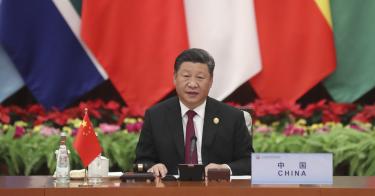The recent Forum on China Africa Cooperation has ended. Held in Beijing, these annual extravaganzas are part of China’s African engagement strategy.
One key goal: to showcase China as a country worthy of emulation and support.
There is reason to admire parts of China’s recent success. Its move toward greater economic freedom, while limited, has helped millions of Chinese rise out of poverty and created what is now the world’s second largest economy.
Yet there is reason to be wary of Beijing’s claims that its developmental paradigm is best suited to bring peace and prosperity to Africa.
The Chinese model couples some economic freedom with repressive governance.
It was born of Beijing’s belief that democracy was a threat to the power of its ruling Communist Party, and would create turmoil that would slow economic growth.
DEMOCRACY
As economic models go, this one is new and relatively untested. It is a path far different from that taken by most of the world’s wealthiest countries, which achieved prosperity without sacrificing political freedoms.
Indeed, some scholars have found a strong correlation between democracy and economic growth. Rejecting democratic principles of governance would be tragic — especially for millions of young Africans who already feel voiceless.
Centuries of experience show that democratic principles provide the best foundation for building political systems that are responsive to ordinary citizens.
My country, the United States, is an excellent example. African-Americans such as myself eventually gained full rights here because our democratic system could not tolerate the contradiction of leaving a significant portion of its citizens voiceless.
When societies reject democratic principles, human suffering inevitably follows.
FREEDOM
Undemocratic systems care little for the individual’s right to life, liberty, and the pursuit of happiness — as tragically illustrated by China’s current imprisonment of as many as one million Uighurs (a religious and ethnic minority) in re-education camps.
Finally, ordinary citizens can do little to hold undemocratic leaders accountable, including in their dealings with foreign governments.
To achieve its potential, Africa needs investment and infrastructure. China can help with that.
Yet only in strong democracies will average citizens be able to pressure their leaders to strike fair deals that benefit more than a small elite.
Those who aspire to freedom and prosperity should urge their governments to manage relations with China carefully. Most African countries won full sovereignty only within the last 60 years, often after costly liberation struggles.
DEBT
Yet today a growing number of African countries find themselves deeply in debt to China, sometimes due to projects of dubious economic value.
There is a real possibility that some of these nations will have to surrender some of their sovereignty to Beijing to settle those debts.
It has already happened in Sri Lanka. That small South Asian nation recently had to give up rights to its Hambantota port for 99 years to China because it could not repay Beijing.
Consider as well that, despite the Chinese government’s many public commitments to the principles of non-interference and respect for sovereignty, it swiftly punishes countries that try to host Tibet’s exiled spiritual leader, the Dalai Lama, or that seek official diplomatic relations with Taiwan.
The lesson is clear: China will respect African countries’ sovereignty as long as doing so advances Beijing’s foreign policy goals.
WOMEN
African countries that choose a different model will find partners, including the US, eager to collaborate with them to build societies that are truly sovereign and both prosperous and free.
The US has a good record in this regard, helping countries such as Japan and South Korea that were once on a developmental par with many African countries.
I am thrilled that the First Lady of the United States will travel to the continent in October to build on the US’s warm history with many African countries.
Mrs Trump’s championing of the critical role of women, including in the building of prosperous and free societies, is an example of the sorts of values underpinning U.S. initiatives in Africa.
The President’s Emergency Plan for AIDS Relief has provided care for millions of Africans, and decreased by up to 40 percent the rate of new HIV infections among young women who are now living monuments to the benefits of US-Africa co-operation.
This piece originally appeared in the Daily Nation




